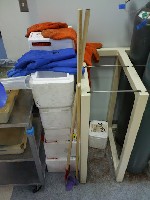 |
 |
 |
 |
 |
 |
 |
 |
 |
 |
 |
 |
An 18-month off-road trial will test underground charging systems to juice up on the go and extend driving range
Institute for Highway Safety is known for crash-test safety ratings, but as cars get smarter there's a need to look beyond crashworthiness
It's just a bit shorter than Mt. Everest
Yosemite, Redwood, and other famous parks as they look from outer space
There's a new contender in the century-old quest for perfect, guiltless sweetness: allulose. It's sugar — but in a form that our bodies don't convert into calories. Perfect? Not quite.
Researchers say findings may have important public health implications as vitamin supplements are relatively safe and cost-effective
Free-living songbirds show increased stress hormone levels when nesting under white street lights. But different light spectra may have different physiological effects as this study finds, suggesting that using street lights with specific colour spectra may mitigate effects of light pollution on wildlife
Sarcoptic mange can leave southern hairy-nosed and bare-nosed wombats blind and deaf before eventually killing them
Scientists identify the condition aphantasia, in which people cannot create images in their head
The dust in our homes contains an average of 9,000 different types of fungi and bacteria, a study suggests.
A mosquito can bear up to 23 times its total body weight on each leg, which is crucial for landing on water – the insect's secret is way it stands
Drones are being used to capture video footage that shows construction progress at the Sacramento Kings’ new stadium in California.
8-year-old Harapan joins his brother at an Indonesian breeding sanctuary; fewer than 100 "hairy rhinos" are left in the world
The white Kermode bear of British Columbia is galvanizing First Nations people fighting to protect their homeland
A naturalist cuts through the myths surrounding the invasive plant
Attracting the right species can help get rid of vine-munching insects and allow farmers to cut back on pesticides
It’s becoming increasingly difficult to keep track of online reading material. That’s why physical print-outs sometimes trump a digital copies
Annual vaccinations could be a thing of the past as scientists have successfully tested vaccines on animals infected with different strains of influenza
Websites try to suggest everything from your next best friend to your next best shirt. But are these recommendations a help or a hindrance?
Tropical species with smaller geographical ranges are more likely to die out in a warming climate than those that can adapt by ‘invading’ new regions
Remember winter, when everything was cold and grey? Right now, when all around is lush and green, the contrast couldn’t be greater. But is everything really as it seems? New research shows that we see things differently in winter compared with summer.
Most people think of bacteria as germs, signs of filth, or unwanted bringers of disease. Slowly, that view …
The gloomy octopuses crowded at Jervis Bay, Australia, appear to spit and throw debris such as shell at each other in what could be an intentional use of weapons
Therapies based on hormones that make us more trusting enhance our natural placebo effect – a finding that could alter the way clinical trials are conducted
A new app called Infltr taps into a smartphone's graphics processor to generate filters on the fly, allowing for the perfect shot in one step
Researchers have long struggled to resolve what happens to information when it falls inside a black hole, but the famous physicist says he has a solution
The blind, hairless babies born recently at Washington D.C.'s National Zoo are completely dependent on their mothers—who can sometimes accidentally crush them.
The poop-hoarding insects have an amazingly advanced internal GPS that allows them to navigate by day or night.
Windows 95, the operating system update that changed the way millions of people interacted with their computers, was released 20 years ago today.
Researchers have been using muons to take a peek inside the nuclear reactors in Japan that melted down in 2011. The results could aid the continuing cleanup operations.

(rant)What exactly is a FaceBook for science anyway? Is any site with a science spin, groups, a forum, and/or user profiles a “FaceBook.” If that’s the case, then there are hundreds of FaceBooks for science out there. I’d argue that the term is deprecated. Many sites employ social tool . . . More

I don't want to admit it, but this is exactly what happened to me today. I was preparing an order for a collaborator and getting 5 of my cell lines out of liquid nitrogen storage. I was explaining to my summer students how to safely handle liquid nitrogen, always wear cryoprotective gloves, lift the rack slowly and be sure to drain all of the liquid nitrogen before handling the boxes, etc. I got the box I needed, and put the rack back in the tank while I was hunting for my cells. Unfortunately, I forgot to put the wire back in the rack that holds the boxes in place. When I went to put the box back that I was handling, I pulled the rack up and half the boxes were gone. "Oh, shit."
So now the rack doesn't fit in . . . More

For starters, I really have no idea what it will take to get scientists to be fully engaged with the on-line world. It's hard enough to get them engaged in the real world (I wish that was a joke…). I think for most scientists to get involved with a network, we're going to have to develop something that significantly increases scientific productivity, and I'm not talking just a free reference management site or being able to post lab retreat pictures to a profile. The last 4-5 years have showed us that scientists really are not interested in FaceBooks for science. The marginal success of ResearchGate, NatureNetwork, and LabSpaces can't be cited as triumphs because very little of wh . . . More
 |
 |

